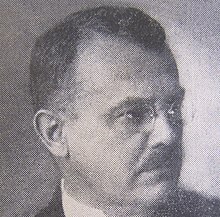Otto Hipp
Otto Hipp (born September 26, 1885 in Munich ; † January 2, 1952 there ) was Lord Mayor of Regensburg during the Weimar Republic and the first Bavarian minister of education after the Second World War .
The lawyer with a doctorate was a member of the Bavarian People's Party , which was founded in Regensburg in November 1918 . On November 28, 1920 he was elected 1st Mayor (Lord Mayor) of Regensburg. On March 20, 1933, Hipp was forced to resign under dramatic circumstances by the National Socialists. Hipp was a staunch opponent of the NSDAP and had forbidden the National Socialists to use city buildings at the beginning of the thirties and, after Hitler came to power and the Reichstag election in March 1933, the hoisting of the swastika flag at the town hall.
After the end of the Second World War, Hipp was appointed 2nd Mayor of Munich by the American occupation forces in Bavaria from May to June 1945 , and subsequently appointed as the first Bavarian Minister of Education after the war. He presented by decree of 23 July 1945, eliminated by the Nazis denominational schools restores what was an important decision for the development of education in Bavaria. Due to content-related differences with the Americans, he was the first member of the Schäffer government to be dismissed after just a few months. At that time, Hipp was already a member of the CSU . In 1950 Hipp was President of the German Catholic Convention in Altötting and Passau . He was a member of the Catholic student association KDStV Aenania Munich in the CV . In 1922 he was one of the founders of the KDStV Trifels Munich.
Individual evidence
- ^ Dieter Albrecht: Regensburg in the course of change studies on the history of the city in the 19th and 20th centuries. MZ, Regensburg 1984, ISBN 3-921114-11-X , p. 218 ff.
- ^ Otto Hipp in the Historisches Lexikon Bayerns , accessed on August 22, 2017
| personal data | |
|---|---|
| SURNAME | Hipp, Otto |
| BRIEF DESCRIPTION | German politician (BV, CSU), Lord Mayor of Munich and first Bavarian Minister of Education after the Second World War |
| DATE OF BIRTH | September 26, 1885 |
| PLACE OF BIRTH | Munich |
| DATE OF DEATH | 2nd January 1952 |
| Place of death | Munich |
